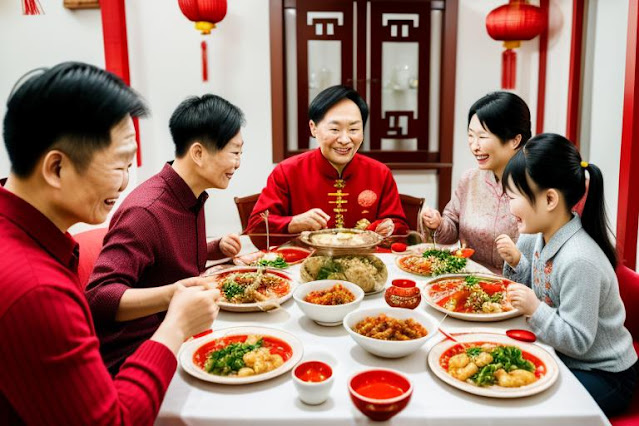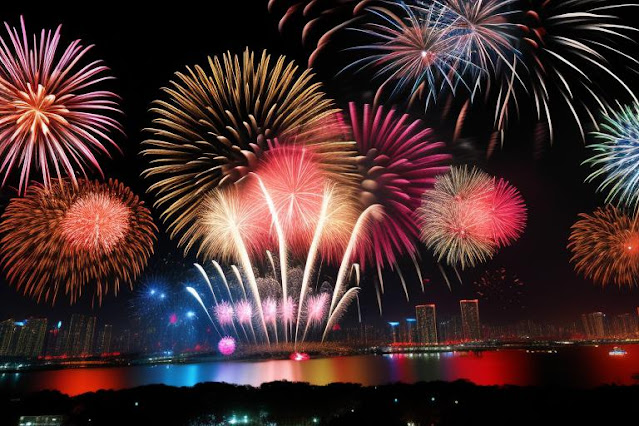Lunar New Year celebrations - Cultural Celebrations and Festivals
Celebrate New Beginnings and Togetherness: All About Lunar New Year!
As the first new moon of the lunar calendar arrives, billions around the world celebrate Lunar New Year! Discover the traditions, customs, and vibrant festivities that mark this joyous occasion, ushering in new beginnings and strengthening the bonds of family and community.
Lunar New Year, also known as the Spring Festival in China, is a grand celebration observed by billions of people across the world. It marks the beginning of a new year on the lunisolar calendar, which is based on both the cycles of the moon and the sun. The date of Lunar New Year varies from year to year, typically falling between late January and mid-February on the Gregorian calendar.
Lunar New Year is a time for families to reunite, share feasts, exchange gifts, and honor ancestors. Traditional activities include:
- Decorating homes with red lanterns, paper cuttings, and couplets
- Enjoying festive meals featuring dumplings, fish, and spring rolls
- Exchanging red envelopes filled with lucky money
- Attending lion and dragon dances, parades, and fireworks displays
The specific traditions and customs of moon Lunar New Year vary depending on the culture and region. However, the core themes of celebrating new beginnings, togetherness, and prosperity remain constant.
Here are some of the countries that celebrate Lunar New Year:
- China
- Vietnam
- Korea
- Singapore
- Malaysia
- Indonesia
- Thailand
- Philippines
- Mauritius
- United States
- Canada
- Australia
If you have the opportunity to experience Lunar New Year firsthand, it is sure to be a memorable and culturally enriching experience.
Celebrating Lunar New Year: Tradition, Culture, and Festivities
Description:
Lunar New Year, also known as Chinese New Year or Spring Festival, is a vibrant and joyous celebration observed by millions of people around the world. This annual event marks the beginning of the lunar calendar and is steeped in rich cultural traditions, symbolisms, and rituals. From colorful parades and fireworks to family gatherings and delicious feasts, Lunar New Year is a time of renewal, hope, and prosperity. Learn more about the significance of this auspicious occasion and how it is celebrated across different cultures..jpg)
Lunar New Year, Chinese New Year, Spring Festival, cultural celebration, traditions, rituals, festivities, symbolism, lunar calendar, family gatherings, prosperity, renewal, fireworks, parades, cultural diversity.
Cultural Celebrations and Festivals
1. When is Lunar New Year celebrated?
Lunar New Year falls on the first new moon of the lunar calendar, typically between late January and mid-February on the Gregorian calendar. In 2024, it falls on Saturday, February 10th.
2. What is Lunar New Year?
Lunar New Year, also known as Chinese New Year or Spring Festival, is the beginning of the lunar calendar year. It is celebrated across various Asian cultures, including Chinese, Korean, Vietnamese, and Tibetan, among others.
Lunar New Year falls on the second new moon after the winter solstice, typically between January 21st and February 20th on the Gregorian calendar. The exact date varies each year based on the lunar calendar.

3. What are some popular traditions of Lunar New Year?
- Decorating homes with red lanterns, paper cuttings, and couplets.
- Enjoying festive meals featuring dumplings, fish, and spring rolls.
- Exchanging red envelopes filled with lucky money.
- Attending lion and dragon dances, parades, and fireworks displays.
4. Which countries celebrate Lunar New Year?
Many countries celebrate Lunar New Year, including China, Vietnam, Korea, Singapore, Malaysia, Indonesia, Thailand, Philippines, Mauritius, the United States, Canada, and Australia.
5. What is the significance of the Year of the Dragon?
2024 marks the Year of the Dragon in the Chinese zodiac. The dragon symbolizes power, strength, good luck, and success.
6. How can I experience Lunar New Year celebrations?
Many communities around the world hold Lunar New Year events, parades, and celebrations. Check with your local cultural centers, community organizations, or Asian restaurants for events near you.
7. What are the symbolic meanings behind Lunar New Year traditions?
Many Lunar New Year traditions are deeply rooted in symbolism. For example, cleaning represents sweeping away bad luck, red symbolizes good fortune and happiness, and fireworks are believed to scare away evil spirits.

8. How do different cultures celebrate Lunar New Year?
While there are similarities in how Lunar New Year is celebrated across different cultures, each has its unique customs and traditions. For example, Chinese celebrations often include dragon and lion dances, while Korean families gather for a ritual called sebae to honor their elders. 9. Is Lunar New Year a public holiday?
In many Asian countries and regions with significant Asian populations, Lunar New Year is indeed a public holiday. However, its observance may vary depending on local customs and traditions.
10. What are some common traditions associated with Lunar New Year?
Common Lunar New Year traditions include cleaning and decorating homes, family reunions, giving red envelopes (hongbao) with money, setting off fireworks, and enjoying special foods like dumplings and rice cakes.










No comments